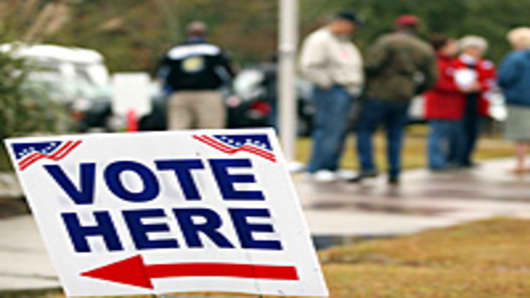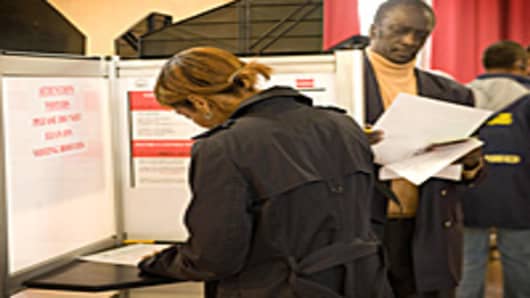Voter fraud in the U.S. is one of two things: It's rampant and requires strict measures like photo IDs to stop it — or — it's a devious ploy to keep certain voters from the polls.
Sorting through the rhetoric — and finding common ground — is as difficult as getting Democrats and Republicans to agree on a tax policy.
In fact, the voting fraud issue tends to fall along party lines, with many GOPers at the forefront of the movement for voter IDs while most Democrats see the requirement as a way to stop certain constituents from voting for them.
Accusations of voter fraud and stuffing ballot boxes have a long history. But a look at recent developments — and trying to separate fact from fiction — shows how contentious the issue and the need for voter IDs has become.
Do states have ID requirements to vote at polls?
Some do and some don't, and the requirements vary.
The first state laws requiring ID's at the polls were passed in 2003. This came on the heels of the 2002 Help America Vote Act that required anyone in the country who registered by mail AND had not previously voted, to show a valid photo ID or a copy of a current utility or bank statement or government check or any ID with a name and address, when they showed up to vote.
The act was a direct result of the hotly contested 2000 presidential election between Al Gore, who won the popular vote, and George W. Bush, who with the Supreme Court's decision, took the electoral vote and the White House.
Which states have voter ID requirements at the polls? Eight states, including Georgia, Indiana, Kansas, Tennessee and Wisconsin require photo IDs at polling stations. South Dakota and Texas have similar laws but are awaiting Justice Department approval before implementing them.
South Carolina prohibits the use of student IDs, as does Texas.
A photo ID or an alternative such as proof of residency or answering personal questions from poll workers are needed in such states as Alabama, Florida, Hawaii, Idaho, Michigan and South Dakota.
Several states, like California, New Mexico, New York, Pennsylvania, Oregon and Illinois, currently do not have any laws requiring IDs when registered voters show up at the polls.
Update:On Monday, March 12, 2012 a Wisconsin judge struck down the voter identification measure signed into law by Governor Scott Walker— ruling that it was unconstitutional because it would deny some the right to vote.
And on the same day, the U.S. Justice Department used its power under the Voting Rights Act to halt the Texas voter ID law—saying that the measure may disproportionately harm Hispanics.
Is there massive voter fraud at the polls?
This is the heart of the controversy, with charges back and forth that fraud is widespread to there's little proof at all.
"There are no major voter fraud cases that we can find," says Keesha Gaskins, a senior counsel for the nonpartisan Brennan Center for Justice at New York University's School of Law.
"We can't say there isn't fraud, but there's no proof it's widespread," Gaskins says.
Current reports of voter fraud have turned out to be inconclusive.
The Department of Justice under President George W. Bush launched a five-year investigation into voter fraud that resulted in 86 convictions across the country.
In a recent attempt to stop the Justice Department from blocking a new voter ID law, South Carolina charged that the names of some 900 dead people were used to cast ballots in 2010. However, a search by the state's election committee showed some inconsistencies in registration but no widespread fraud.
And while defending its photo ID law before the Supreme Court in 2008, Indiana failed to cite one instance of voter impersonation. But the court ruled in favor of the law, and many states followed with their own versions.
Regardless of the case, some say the need for tough voter ID laws is just common sense.
"Is voting so unimportant it doesn't deserve such a basic obvious protection?" asks Ted Scofield, a New York lawyer and former political consultant.
"If something as simple as requiring IDs would reduce errors, why not implement it?" Scofield contends. "I was asked for an ID recently at a drug store for cough syrup. Voting is not less important."
"Voter IDs are suppression tactics."
What is the impact of tougher voter IDs on voters?
Again, the facts are elusive, but opinions are plenty.
"These voter ID laws are clearly voter suppression tactics," says Melanie Campbell, president and CEO of the National Coalition on Black Civic Participation.
"These laws are not addressing fraud but are modern-day poll taxes designed to remove eligible voters from our democracy. They should be stopped immediately," she says.
But others say voters don't mind the requirement.
"Many people thanked us for asking for IDs," says Deborah Chamberlain, a poll worker in Wauwatosa, Wis., since 2000 and the owner of a media and marketing service.
"People had been offering photo IDs before they were required here as a show of support prior to passage of the law (in 2010)," Chamberlain says.
Many Americans eligible to vote don't have photo IDs — not everyone drives a car or needs to. Some people don't belong to a group or organization that provides photo IDs.
It's estimated that 11 percent of all voting age citizens — and some 18 percent of people over 65 — don't have photo IDs, but would have other forms of identification. As many as 25 percent of African-Americans are said to lack acceptable identification for some current ID laws.
Studies on voter suppression show some negative results — even if slightly. A paper from the Harvard Law and Policy Review that studied voter ID laws from 2002 to 2006 concluded that there was a 1.1 percent decline in voter turnout in states that had photo ID laws during those four years.
The paper also concluded that by 2006, the states without ID requirements or with nonphoto ID laws at the polls showed higher voter turnout than states that had either one.
Where are voter ID laws headed?
In the end, it may fall mostly along party lines. Just one state with a Democratic controlled legislature — Rhode Island in 2011 — has passed a voter ID law so far.
The Justice Department can step in to block the laws, but only in certain states that have a "history of discriminatory practices" as part of the Voting Rights Act of 1965. The department did so in the case of South Carolina's law but the state is appealing the decision.
In an era of state budget cutbacks, the cost for the laws has not come cheap. Indiana's cost taxpayers more than $10 million just to issue new IDs, according to reports . Estimates by other states projected costs of up to $25.2 million in North Carolina over three years and $16.9 million in Missouri over three years.
Cost aside, those against the voter ID laws say the system does need some updating.
"Voting registration lists do need cleaning up and to be current," says Brennan's Gaskins. "Certainly those that have passed away and those not eligible to vote should be taken out. But voter IDs at the poll doesn't ensure voting rights."
What's missing from the overall discussion is how to get more Americans legally into the voting booths, says Chamberlain, the Wisconsin poll worker.
"Personally, I haven't seen any fraud." Chamberlain says. "But I think we need voter IDs. We also need the state to help people who have problems getting IDs. Even one legal voter should not be held back from this basic right."
.





